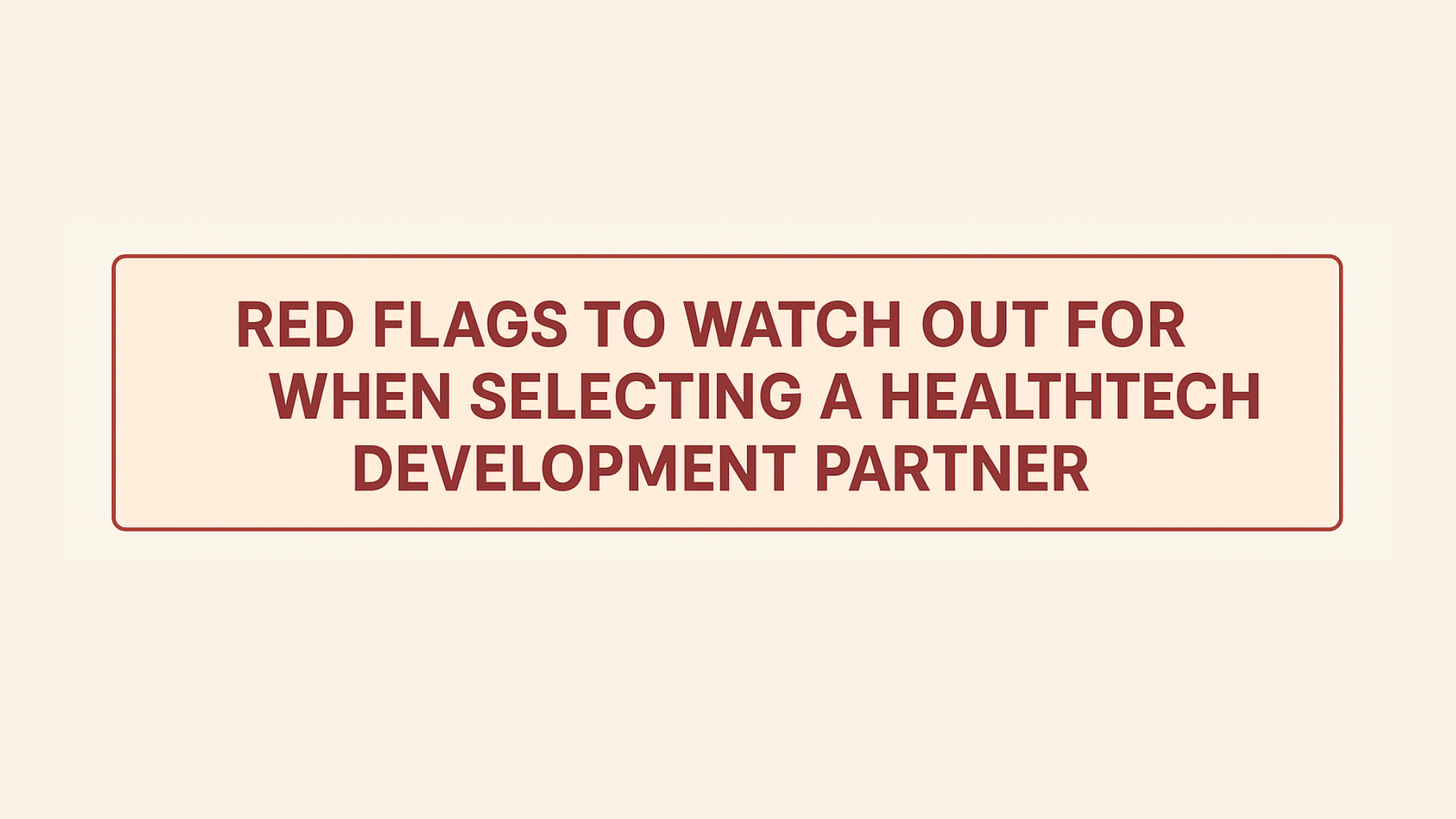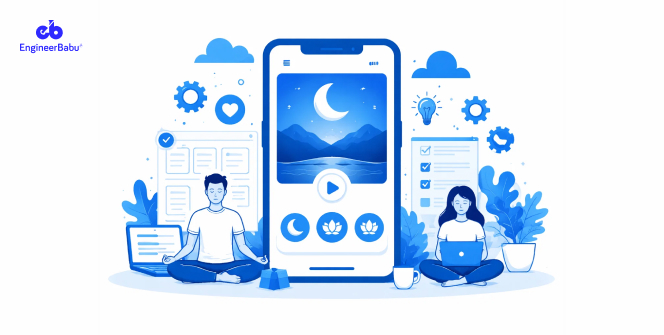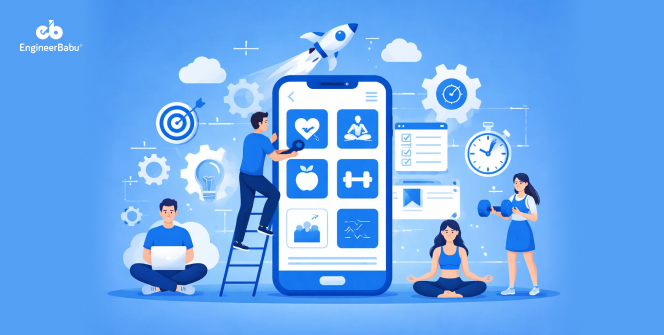Every year, dozens of healthcare apps quietly shut down because they failed compliance audits, mishandled patient data, or couldn’t integrate with real hospital systems. These issues are major red flags in healthtech development partners—not because the idea was bad, but because the wrong team built it.
Choosing a HealthTech development partner is one of the highest-risk decisions you will make. You are not buying an app. You are building something that needs to survive legal reviews, cybersecurity scrutiny, and clinical realities — all at once.
And here’s the problem: bad vendors often sound convincing at first. They throw around words like HIPAA, HL7, and interoperability… but when deadlines hit, the cracks show fast.
Before you hire anyone, watch for these 12 red flags. Spotting them early can save you from massive headaches, lawsuits, and product failure later.
12 Red Flags In HealthTech Development Partners To Watch Out
Lack of Healthcare-Specific Experience
Building a HealthTech app is nothing like building an e-commerce store or a food delivery platform. Healthcare demands a deep understanding of patient data handling, clinical workflows, and strict regulatory frameworks.
If your development partner has no real experience with HIPAA, HL7, FHIR, or integrating with hospital systems like Epic or Cerner, you are putting your project at serious risk.
It’s not enough for them to say they’ve worked “in healthcare” — ask for specific case studies. Look for examples where they built apps that passed audits, handled PHI securely, or integrated seamlessly with existing healthcare infrastructure. In HealthTech, experience isn’t a nice-to-have. It’s non-negotiable.
No Clear Understanding of HIPAA, GDPR, or HL7 Standards
Lots of vendors will claim their apps are “HIPAA-compliant” or “secure.” Very few can actually explain what that means in practice. A real healthcare development partner should be able to walk you through their approach to compliance in simple, clear language.
They should know the key parts of HIPAA, like the Privacy Rule and Security Rule. They should understand how GDPR affects the storage and processing of patient data for EU users. They should know how HL7 and FHIR APIs allow your app to talk to hospital systems.
If a vendor only mentions surface-level things like “we encrypt everything,” that’s a red flag. True healthcare compliance is detailed and baked into every part of the app, from login screens to backend servers.
Overpromising Unrealistic Timelines and Costs
Healthcare apps aren’t simple projects you can rush. They need user research, clinical validation, secure architecture, and careful integration testing. If a vendor promises you a fully compliant telehealth app in six weeks for $10,000, it’s time to ask hard questions.
Either they don’t understand the real scope, or they plan to cut dangerous corners you won’t see until your app is live. Good HealthTech partners will set realistic expectations upfront. They’ll warn you about HIPAA assessments, security audits, pilot programs, and other critical steps that take time.
In HealthTech, moving too fast without a strong foundation usually means crashing even faster once real patients and regulators get involved.
No Proven Track Record or Case Studies
Anyone can build a good-looking website. What matters is whether they have real proof of delivering successful healthcare projects. If a company cannot show detailed case studies or client references in the HealthTech space, that’s a serious warning sign.
Ask for examples of apps they have built that handle sensitive health data or integrate with medical systems. Look for projects that made it through security audits, compliance checks, or live hospital deployments.
Without a track record, you are betting your product on a team that may not fully understand the risks involved.
Weak Data Security Practices
Security in healthcare isn’t optional. One breach can destroy your credibility, attract lawsuits, and cost millions in regulatory fines. Yet, many development companies still treat security as an afterthought instead of a core priority.
During early conversations, ask about their approach to data encryption, user authentication, role-based access control, and vulnerability testing.
If their answers are vague, surface-level, or overly casual, that’s a major red flag. Your partner must have documented security policies, regular penetration testing routines, and a clear breach response plan — ready before a single line of code is written.
Poor Communication and Lack of Transparency
Early communication patterns often predict how a project will unfold. If a vendor is slow to respond, avoids direct answers, or glosses over important details during the sales process, you can expect bigger problems once development begins.
Clear, proactive communication is critical in healthcare app projects, where unexpected hurdles like regulatory changes or new clinical requirements are common. If your development partner cannot collaborate openly and address problems early, small misalignments will quickly turn into major delays and costly fixes.
Look for teams that provide regular project updates, transparent sprint planning, and honest discussions about risks and trade-offs from the very beginning.
No Formal Testing and QA Process
In HealthTech, bugs can have real-world consequences, not just angry reviews. You cannot afford a team that sees testing as a final checkbox before launch. A real HealthTech development partner will have structured, continuous quality assurance built into their entire process.
Ask how they handle unit testing, integration testing, performance testing, and compliance testing. Check whether they use real devices for testing, not just simulators. Confirm they validate workflows against clinical use cases, not just general user behavior.
If their testing approach sounds ad-hoc or rushed, your product will not survive in regulated environments.
No Post-Launch Support or Maintenance Plan
Launching your app is just the beginning. The real work starts once doctors and patients begin using it in real-world settings. Healthcare apps need constant attention, including security patches, OS updates, server maintenance, and compliance renewals.
If a development partner has no clear post-launch support model, that creates major risks. You do not want to scramble for help when an iOS update suddenly breaks your login system or a security standard changes overnight.
A reliable partner will offer ongoing monitoring, regular updates, SLA-backed maintenance plans, and emergency support options to keep your app stable, secure, and compliant after launch.
No Knowledge of Integration with EHR/EMR Systems
Very few healthcare apps operate as standalone tools anymore. Most need to pull or push data from EHR or EMR systems like Epic, Cerner, or Allscripts. If your development partner has no experience with HL7 interfaces, FHIR APIs, or hospital integration workflows, that’s a dealbreaker.
Integration in healthcare is messy. There are outdated systems, messy data formats, and strict interoperability standards to navigate. If your app cannot talk to other systems, it becomes nearly useless for doctors, nurses, and administrators.
Rigid, Non-Agile Development Process
Healthcare is a moving target. Regulations change, patient needs evolve, and clinical feedback often reshapes product priorities. If your development partner is rigid, slow to adapt, or unwilling to change course mid-project, your app will quickly fall behind real-world demands.
Agile development is not just a buzzword in HealthTech; it is a necessity. Your partner should be comfortable with iterative releases, rapid prototyping, and adjusting based on feedback from clinicians, administrators, and patients.
If they insist on a fixed-scope, fixed-plan model with no room for flexibility, it is a serious red flag that can hurt your product’s success.
IP Ownership and Code Access Unclear
You should never launch a healthcare app without full ownership of your code, your data, and your platform. Yet some vendors lock clients into hidden licensing agreements or restrict access to source code, APIs, or cloud accounts.
Always clarify IP ownership terms before you sign anything. Ensure that once payment is completed, you own 100% of the source code, documentation, and user data. Otherwise, you risk becoming dependent on a single vendor for every future change, fix, or upgrade — at whatever price they demand.
No Commitment to Scalability or Long-Term Tech Upgrades
A HealthTech app that works fine with 100 users might collapse when scaled to 10,000 patients across multiple clinics. If your partner is only thinking about getting the MVP launched, and not about how to grow and maintain it long term, that’s a major warning.
Ask how they plan for scalability from day one. Look for cloud-native architectures, microservices, secure APIs, and database models that can handle future growth. Also check if they track emerging tech trends like remote patient monitoring (RPM), AI diagnostics, or telehealth platform evolution.
Conclusion
Hiring a HealthTech development partner is one of the most important decisions you will make. In healthcare, the cost of picking the wrong team isn’t just financial. It can lead to compliance violations, security breaches, or products that simply fail real-world use.
Red flags are easy to miss when you are excited to build something new. That’s why you need to stay sharp during the early conversations. If a company cannot show healthcare-specific experience, explain compliance clearly, or plan for real-world integration and scaling, it is better to walk away early.
Protect your project, your users, and your vision by choosing a partner who understands the true weight of building technology in healthcare.
FAQs
Why is it risky to hire a general app development company for a healthcare product?
Healthcare apps involve strict compliance, sensitive data handling, and system integrations that general app developers often overlook. Without deep healthcare experience, a development team can create apps that fail audits, breach patient privacy, or break during clinical use.
What should I ask a HealthTech development company during the first meeting?
Ask about their experience with HIPAA, GDPR, and HL7/FHIR standards. Request real healthcare case studies. Clarify their security practices, post-launch support, and IP ownership policies. Make sure they understand healthcare integration challenges and compliance frameworks in depth.
How can I spot poor data security practices early?
If a company speaks vaguely about “secure coding” but cannot explain encryption methods, access controls, or breach protocols, that is a red flag. Real healthcare partners have detailed security plans ready to discuss, including real-world penetration testing and privacy-by-design approaches.
How important is post-launch support for HealthTech apps?
Post-launch support is critical. Healthcare apps must be updated regularly to meet new security standards, fix vulnerabilities, and adapt to clinical feedback. Without a maintenance plan, your app could quickly become non-compliant or vulnerable after launch.
How does EngineerBabu support healthcare startups with HealthTech development?
EngineerBabu specializes in building scalable, secure, and compliant healthcare apps. Their HealthTech teams have deep experience with HIPAA, GDPR, HL7, and FHIR standards. They offer end-to-end support — from product discovery and compliance-driven development to system integration and post-launch maintenance. Startups trust EngineerBabu to build products that survive audits, delight users, and scale reliably.



